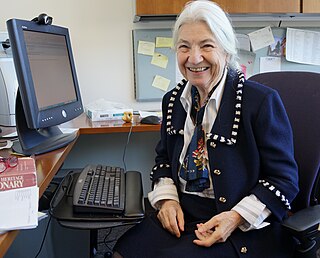Related Research Articles

Judea Pearl is an Israeli-American computer scientist and philosopher, best known for championing the probabilistic approach to artificial intelligence and the development of Bayesian networks. He is also credited for developing a theory of causal and counterfactual inference based on structural models. In 2011, the Association for Computing Machinery (ACM) awarded Pearl with the Turing Award, the highest distinction in computer science, "for fundamental contributions to artificial intelligence through the development of a calculus for probabilistic and causal reasoning". He is the author of several books, including the technical Causality: Models, Reasoning and Inference, and The Book of Why, a book on causality aimed at the general public.

Thomas Shi-Tao Huang was a Chinese-born American computer scientist, electrical engineer, and writer. He was a researcher and professor emeritus at the University of Illinois at Urbana-Champaign (UIUC). Huang was one of the leading figures in computer vision, pattern recognition and human computer interaction.
James Loton Flanagan was an American electrical engineer. He was Rutgers University's vice president for research until 2004. He was also director of Rutgers' Center for Advanced Information Processing and the Board of Governors Professor of Electrical and Computer Engineering. He is known for co-developing adaptive differential pulse-code modulation (ADPCM) with P. Cummiskey and Nikil Jayant at Bell Labs.
Ernst Adolph Guillemin was an American electrical engineer and computer scientist at the Massachusetts Institute of Technology who spent his career extending the art and science of linear network analysis and synthesis. His nephew Victor Guillemin is a math professor at MIT, his nephew Robert Charles Guillemin was a sidewalk artist, his great-niece Karen Guillemin is a biology professor at the University of Oregon, and his granddaughter Mary Elizabeth Meyerand is a Medical Physics Professor at the University of Wisconsin-Madison.
Ekaterini Panagiotou Sycara is a Greek computer scientist. She is an Edward Fredkin Research Professor of Robotics in the Robotics Institute, School of Computer Science at Carnegie Mellon University internationally known for her research in artificial intelligence, particularly in the fields of negotiation, autonomous agents and multi-agent systems. She directs the Advanced Agent-Robotics Technology Lab at Robotics Institute, Carnegie Mellon University. She also serves as academic advisor for PhD students at both Robotics Institute and Tepper School of Business.

Ruzena Bajcsy is an American engineer and computer scientist who specializes in robotics. She is professor of electrical engineering and computer sciences at the University of California, Berkeley, where she is also director emerita of CITRIS.

Joseph Brant Arseneau is an entrepreneur and executive, best known for his work in both fintech and space technology. He is generally known in finance for his work in Electronic Trading, Renewable Energy Derivatives, and Capital Markets technology. He has been both a chief information officer (CIO) for large banks and an entrepreneur, having started several fintech start-ups. Arseneau has moved into the NewSpace industry and is currently a founding partner at 9Point8 Capital and a founder of Spaced Ventures.

Mathukumalli VidyasagarFRS is a leading control theorist and a Fellow of Royal Society. He is currently a Distinguished Professor in Electrical Engineering at IIT Hyderabad. Previously he was the Cecil & Ida Green (II) Chair of Systems Biology Science at the University of Texas at Dallas. Prior to that he was an executive vice-president at Tata Consultancy Services (TCS) where he headed the Advanced Technology Center. Earlier, he was the director of Centre for Artificial Intelligence and Robotics (CAIR), a DRDO defence lab in Bangalore. He is the son of eminent mathematician M V Subbarao.

Jeffrey Adgate "Jeff" Dean is an American computer scientist and software engineer. Since 2018, he has been the lead of Google AI. He was appointed Alphabet's chief scientist in 2023 after a reorganization of Alphabet's AI focused groups.
Stephen P. Boyd is an American professor and control theorist. He is the Samsung Professor of Engineering, Professor in Electrical Engineering, and professor by courtesy in Computer Science and Management Science & Engineering at Stanford University. He is also affiliated with Stanford's Institute for Computational and Mathematical Engineering (ICME).

Salvatore Domenic Morgera is an American and Canadian engineer, scientist, inventor, and academic. Morgera is a Tau Beta Pi Eminent Engineer, Life Fellow of the Institute of Electrical and Electronics Engineers (IEEE), Fellow of the Institution of Engineering and Technology(IET), Fellow of the American Association for the Advancement of Science (AAAS), Fellow of the Asia-Pacific Artificial Intelligence Association (AAIA), Professor of Electrical Engineering, Professor of Biomedical Engineering, and Director of the C4ISR Defense & Intelligence and Bioengineering Laboratories at the University of South Florida and Professor Emeritus at McGill University, Concordia University, and Florida Atlantic University.

Shrikanth Narayanan is an Indian-American Professor at the University of Southern California. He is an interdisciplinary engineer–scientist with a focus on human-centered signal processing and machine intelligence with speech and spoken language processing at its core. A prolific award-winning researcher, educator, and inventor, with hundreds of publications and a number of acclaimed patents to his credit, he has pioneered several research areas including in computational speech science, speech and human language technologies, audio, music and multimedia engineering, human sensing and imaging technologies, emotions research and affective computing, behavioral signal processing, and computational media intelligence. His technical contributions cover a range of applications including in defense, security, health, education, media, and the arts. His contributions continue to impact numerous domains including in human health, national defense/intelligence, and the media arts including in using technologies that facilitate awareness and support of diversity and inclusion. His award-winning patents have contributed to the proliferation of speech technologies on the cloud and on mobile devices and in enabling novel emotion-aware artificial intelligence technologies.

Pascale Fung (馮雁) is a professor in the Department of Electronic & Computer Engineering and the Department of Computer Science & Engineering at the Hong Kong University of Science & Technology(HKUST). She is the director of the Centre for AI Research (CAiRE) at HKUST. She is an elected Fellow of the Institute of Electrical and Electronics Engineers (IEEE) for her “contributions to human-machine interactions”, an elected Fellow of the International Speech Communication Association for “fundamental contributions to the interdisciplinary area of spoken language human-machine interactions” and an elected Fellow of the Association for Computational Linguistics (ACL) for her “significant contributions toward statistical NLP, comparable corpora, and building intelligent systems that can understand and empathize with humans”.
Ranjan Kumar Mallik is an Indian electrical and communications engineer and a professor at the Department of Electrical Engineering of the Indian Institute of Technology, Delhi. He held the Jai Gupta Chair at IIT Delhi from 2007 to 2012 and the Brigadier Bhopinder Singh Chair from 2012 to 2017. He is known for his researches on multiple-input multi-output systems and is an elected fellow of all the three major Indian science academies viz. Indian Academy of Sciences, Indian National Science Academy, and The National Academy of Sciences, India. He is also an elected fellow of The World Academy of Sciences, Indian National Academy of Engineering, and The Institute of Electrical and Electronics Engineers, Inc.

Larry Paul Heck is the Rhesa Screven Farmer, Jr., Advanced Computing Concepts Chair, Georgia Research Alliance Eminent Scholar, Chief Scientist of the AI Hub, Executive Director of the Machine Learning Center, and Professor at the Georgia Institute of Technology. His career spans many of the sub-disciplines of artificial intelligence, including conversational AI, speech recognition and speaker recognition, natural language processing, web search, online advertising and acoustics. He is best known for his role as a co-founder of the Microsoft] Cortana] Personal Assistant and his early work in deep learning] for speech processing.
Jianchang (JC) Mao is a Chinese-American computer scientist and Vice President, Google Assistant Engineering at Google. His research spans artificial intelligence, machine learning, computational advertising, data mining, and information retrieval. He was named a Fellow of the Institute of Electrical and Electronics Engineers (IEEE) in 2012 for his contributions to pattern recognition, search, content analysis, and computational advertising.

Stephen John Young is a British researcher, Professor of Information Engineering at the University of Cambridge and an entrepreneur. He is one of the pioneers of automated speech recognition and statistical spoken dialogue systems. He served as the Senior Pro-Vice-Chancellor of the University of Cambridge from 2009 to 2015, responsible for planning and resources. From 2015 to 2019, he held a joint appointment between his professorship at Cambridge and Apple, where he was a senior member of the Siri development team.
Mengchu Zhou is a Chinese-American Distinguished Professor of electrical and computer engineering in the Helen and John C. Hartmann Dept. of Electrical and Computer Engineering at New Jersey Institute of Technology (NJIT) and at Macau University of Science and Technology. He is the Chairman of IKAS Industries of Shenzhen in China and a Board Member of OneSmart Education Group headquartered in China.
Yihong Qi is an engineer, professor, entrepreneur, and inventor. His work focuses on networking science and technology. Qi is currently an adjunct professor of Electrical and Computer Engineering at the Missouri University of Science and Technology. He is a Fellow of The Canadian Academy of Engineering and of the National Academy of Inventors. Qi's research has led to the founding of five independent companies.

Nitesh V. Chawla is a computer scientist and data scientist currently serving as the Frank M. Freimann Professor of Computer Science and Engineering at the University of Notre Dame. He is the Founding Director of the Lucy Family Institute for Data & Society. Chawla's research expertise lies in machine learning, data science, and network science. He is also the co-founder of Aunalytics, a data science software and cloud computing company. Chawla is a Fellow of the: American Association for the Advancement of Sciences (AAAS), Association for Computing Machinery (ACM), Association for the Advancement of Artificial Intelligence, Asia Pacific Artificial Intelligence Association, and Institute of Electrical and Electronics Engineers (IEEE). He has received multiple awards, including the 1st Source Bank Commercialization Award in 2017, Outstanding Teaching Award (twice), IEEE CIS Early Career Award, National Academy of Engineering New Faculty Award, and the IBM Big Data Award in 2013. One of Chawla's most recognized publications, with a citation count of over 30,000, is the research paper titled "SMOTE: Synthetic Minority Over-sampling Technique." Chawla's research has garnered a citation count of over 65,000 and an H-index of 81.
References
- ↑ "2012 elevated fellow" (PDF). IEEE Fellows Directory. Archived from the original (PDF) on February 15, 2012.